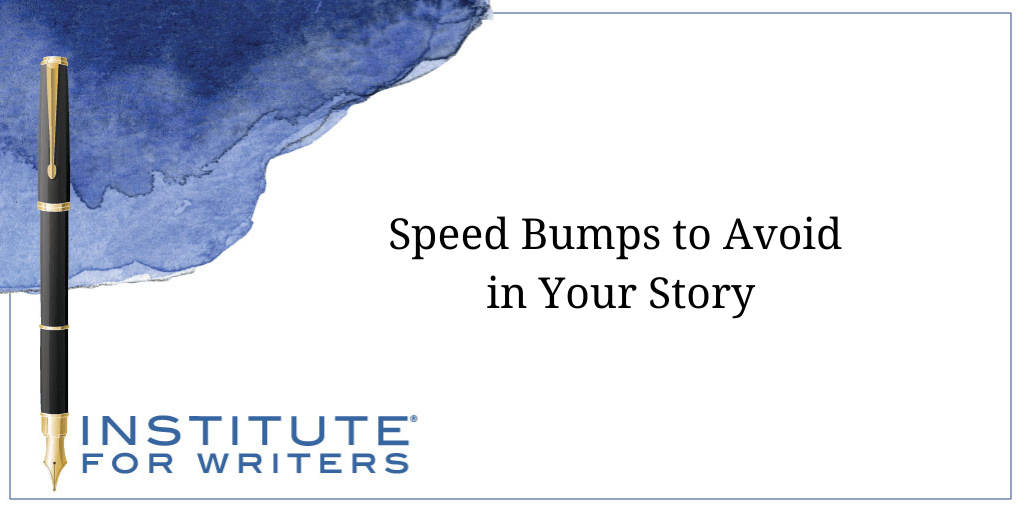
Why Submitting to Contests is a Win-Win
Should you enter a writing contest or not? If your writing rises to the top, you just might win a prize upwards of thousands of dollars if you’re lucky.

We’ve all driven over speed bumps. Some aren’t too bad. Others are like mini mountains that practically stop the car dead. In Britain, they call them “sleeping policemen.” All have one purpose: slow cars down. You’ll find them in parking lots and even some streets. But you don’t want bumps in your story to slow your readers and especially ones that bring readers to a full stop. At least not unintentionally. Save that for the “whoa” moments.
Let’s discuss types of story speed bumps.
Recently I was reading a novel about time travelers going back to Paris in 1925. I’m enjoying the story and descriptions of clothing, until… One character was described as having a bob cut above her ears. It pulled me out of the story. What would that look like? Would they shave the back of her head so the back matched the length on the sides? These days I could see that, but back in the nineteen-twenties? Not so much. I even went online and looked at bob images from that time period. Yes, I was correct. Bobs were below the ears.
 Another example, I read a book about a young man joining the Marines. Another person in the story mentioned the six weeks of boot camp. My son-in-law was a Marine. Boot camp for him was thirteen weeks. The writer probably assumed the length of time. A simple internet research would have pointed out the discrepancy. But don’t look at only one source. This article gives sources for each military branch. It says Marines are twelve weeks. However, this source, Marine’s Parents FAQ, says one week of receiving followed by twelve weeks of training. The kid will be gone for thirteen weeks.
Another example, I read a book about a young man joining the Marines. Another person in the story mentioned the six weeks of boot camp. My son-in-law was a Marine. Boot camp for him was thirteen weeks. The writer probably assumed the length of time. A simple internet research would have pointed out the discrepancy. But don’t look at only one source. This article gives sources for each military branch. It says Marines are twelve weeks. However, this source, Marine’s Parents FAQ, says one week of receiving followed by twelve weeks of training. The kid will be gone for thirteen weeks.
Other wrongs in writing include: contradictory actions, oxymorons, and anachronisms.
You may think, what’s the big deal? But an obvious error can make a reader wonder what else the writer got wrong. “Getting these facts wrong in fiction is certainly a less grievous error than getting your facts wrong in non-fiction. But it is enough to turn off certain readers from your book, and that’s reason enough to be cautious.” – Tim McConnehey
My critique partners call me the As Nazi—yes, once I learned it, the overuse really bugs me. For example, when reading the opening of a mystery, I spotted four sentences that started with “as” and another sentence also included an “as.” In a total of eight sentences. (I stopped reading.) Here’s my own example with the same number of sentences and “as”es.
1) Sandra dropped her keys as a noise behind her startled her. 2) She checked over her shoulder. 3) Nothing in the dimly lit hallway. 4) As she bent to pick up the keyring, it came again. 5) As she snatched up the keys, the skin of her back crawled. 6) As she searched for the key to her apartment, her fingers trembled. 7) Click—there it was again. 8) As Sandra shoved the key in the lock, a small flame caught her attention.
Writing that made me cringe. Let’s talk about why.
Sentences 1 and 6 are both examples of showing simultaneous actions but in the wrong chronological order. What happens first in 1? The noise. It should be first. Possible rewrite: A noise behind Sandra startled her and she dropped her keys. 6 also has a misplaced modifier. Possible rewrite: With trembling fingers, she searched for the key to her apartment.
Sentences 4, 5, and 6 start with “As she.” Varying sentence structure will make the text more interesting. One way to do so is by using a conjunction. Possible rewrites for #5: The skin of her back crawled, but she snatched up the keys. OR She snatched up her keys and tried to ignore the crawling sensation going up her back.
Sentence 8 starts with “As Sandra.” Sometimes we need to use words other than “as” such as “while” or “when.” One possible rewrite: When Sandra shoved the key in the lock, a small flame caught her attention. Or the prepositional phrase could be cut entirely: A small flame caught Sandra’s attention. Better yet would be less passive—less distancing. A small flame licked the edge of the door.
Of course, “as” is not the only word overused in writing. See the resources for more.
Warning signs are verbs preceded by “are,” “were,” “was” and verbs ending in “ing.” “Began to” and “started to” are also passive. The character needs to do the action. Here’s a dreadful example I created written in past continuous:
John was walking down the street to the hospital. He was opening the candy bag and was eating the toffees one by one. He was going to work.
 The “was”es and “ing”s are overwhelming. (Present tense would be equally terrible: “is walking,” “is opening,” etc.) Plus there’s no variety in the sentence structure. A possible rewrite: John walked down the street to the hospital. Opening the candy bag, he ate the toffees one by one until he got to work.
The “was”es and “ing”s are overwhelming. (Present tense would be equally terrible: “is walking,” “is opening,” etc.) Plus there’s no variety in the sentence structure. A possible rewrite: John walked down the street to the hospital. Opening the candy bag, he ate the toffees one by one until he got to work.
What about “began” or “started?” Sure, sometimes a character starts to say something or do something, but most of the time he or she simply does the action. One “Sally began to cross the room” or one “Manuel started to eat his dinner” won’t stop me, but multiple ones will.
“There is/are” or “there was/were” can be passive too.
There were many people in the concert hall.
That’s a fact but what were these people doing? Clapping, cheering? Sucking in a breath of shock? Give the reader a more active picture. Perhaps: The audience in the concert hall booed the comedian on stage. Now we know more specifically who these people were—audience—an action—booed—and who was causing the displeasure.
Back to Sandra and the flame. My rewrite: A small flame licked the edge of the door doesn’t say Sandra saw it. But readers will assume events that happen around Sandra are something she is experiencing. Just let the reader see what Sandra sees.
Here’s a hilarious quote on passive versus active: “[The active voice is the] vigorous voice, unashamed to say whodunit. Passive voice is preferred by the weak, the cowardly, ashamed to name the fink who told them what they are evasively telling you.” – John Bremner
Making sure your facts are correct, you’re careful about overusing words, and using an active voice will definitely make your writing stronger.
Don’t Be Wrong—Check Your Facts
“Fact-Checking Tips for Indie Authors” by Tim McConnehey
“How To Fact-Check Fiction and Creative Nonfiction” from Writers Relief
“Research Pitfalls and How to Avoid Them” by Paula Morrow
Watch your “As”es and Other Overused Words
“17 Weak Words to Avoid in Your Writing” by Catia Shattuck
“Overused Words (Updated)” by Justine Larbalestier
“Prepositional Phrases and Why They Shouldn’t Be Overused” by Karen DeGroot Carter
Passive Writing
“Avoiding the Passive Voice” from College of William & Mary
“Passive Voice: How to Recognize It and Fix It in Creative Writing” by Caitlin Berve
Stephen King on “Why and How to Avoid Passive Voice”

Should you enter a writing contest or not? If your writing rises to the top, you just might win a prize upwards of thousands of dollars if you’re lucky.

To many, writing is revision, and most writers revise their manuscripts numerous times before they’ve shaped it into the best version that it can be.

We’re going to look at influential female authors of the past, those impacting the present, and whom the industry expects to make a big splash.
1000 N. West Street #1200, Wilmington, DE 19801
© 2024 Direct Learning Systems, Inc. All rights reserved.

1000 N. West Street #1200, Wilmington, DE 19801
© 2025 Direct Learning Systems, Inc. All rights reserved.

1000 N. West Street #1200, Wilmington, DE 19801
©2025 Direct Learning Systems, Inc. All rights reserved. Privacy Policy.